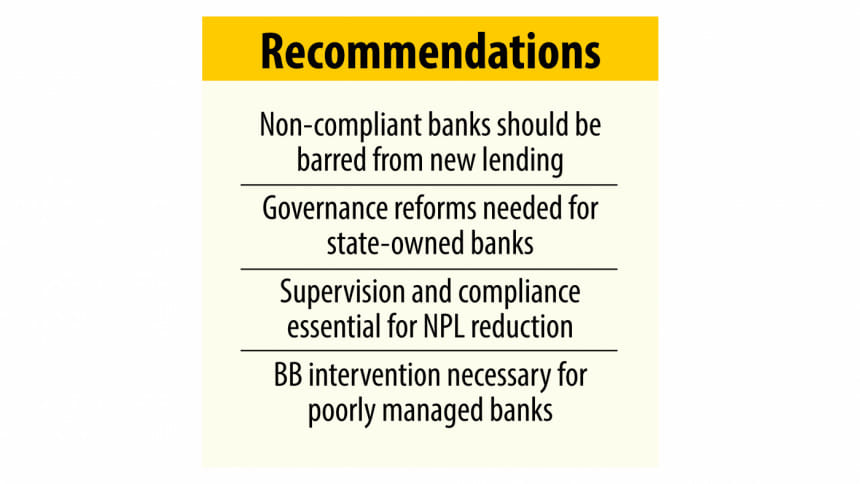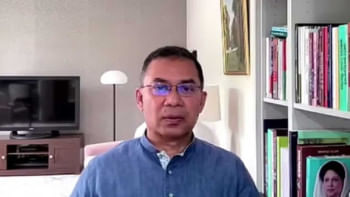Bar non-compliant banks from giving new loans

Non-compliant banks should be barred by the central bank from providing new loans until they ensure compliance, according to a top economist.
Sadiq Ahmed, vice-chairman of the Policy Research Institute, also said that Bangladesh Bank's action plans for non-performing loans are inadequate.
"The best way to reduce the NPL ratio and lower the risk to the banking sector would be to restrict these non-compliant banks from new lending until such a time that they are able to restore compliance with the Basel 3 capital adequacy norm and reduce the NPL to below 10 percent," Ahmed said.
He added that the central bank's action plans to improve governance in the banking sector fall short in a major way because there is little discussion of how the governance structure of state-owned commercial banks (SoCBs) will be reformed to avoid the future growth of NPLs.
The only sustainable way to reduce NPLs and rescheduled loans in SoCBs is for these banks to be converted into profit-making enterprises with a professional board and management, he said.
Citing BB data, he said there were 16 banks where the NPL ratio exceeded 10 percent and 9 banks where the NPL ratio exceeded 20 percent as of June 2023.
"They must be fully supervised by BB and subject to full regulatory and prudential norms with compliance within a reasonable but strict timeline. There can be no political interference in lending decisions or loan repayment terms. BB needs to think through carefully whether the SoCBs governance reform challenge has been adequately addressed by the action plan," Ahmed said.
He added that a high and growing share of NPLs is a signal that the concerned banks are not managed well. So, BB intervention is needed.
He was speaking at a discussion titled "Stabilizing the Macroeconomy of Bangladesh: Issues and Challenges" organised by the Metropolitan Chamber of Commerce and Industry, Dhaka (MCCI) at its office in Gulshan yesterday.
The main macroeconomic concerns can be summarised in four parts, according to him.
Firstly, owing to global inflation, imports surged by an unprecedented 18 percent in FY2022, leading to a large trade and current account deficit.
Secondly, even with the imposition of import controls and tariff escalation, the government could not stem the loss of foreign exchange reserves and was forced to let some of the adjustment happen through the exchange rate.
As a result, the taka depreciated by 30 percent between June August 2021 and September 2023, from Tk 85.2 per US dollar to Tk 110.5.
Thirdly, the annualised rate of inflation surged from 5.9 percent in January 2022 to 9.9 percent in August 2023.
Fourthly, domestic revenue growth was adversely affected by external shocks, but no serious effort has been made to reverse the effects of these shocks and increase the tax-to-GDP ratio for a long time.
The external shocks increased budget subsidies, which have also not been tackled with domestic reforms.
He said although the government lays the blame for the macroeconomic difficulties on external shocks, a careful review of the facts suggesta that the fundamental source of the current macroeconomic imbalances lies in several policy mistakes and the absence of adequate corrective policy measures.
"The external shocks simply exposed the underlying macroeconomic vulnerabilities," he opined.
He further said many of the sources of macroeconomic difficulties have been long simmering.
These include weaknesses in the management of the exchange rate, ineffective tax policy management, taking control of interest rates in April 2020, the growing incidence of fiscal subsidies owing to poor pricing policies, and inefficiencies in managing the State-Owned Enterprises (SoEs).
"The adverse pressure of such weak policy management has been building up slowly, but the acceleration of GDP growth, owing to the contributions of the RMG sector, foreign remittances, and the agricultural sector, clouded the visibility of these problems. The series of external shocks related to Covid-19, global inflation and the Russia-Ukraine war ignited the flame that exposed the underlying macroeconomic problems."
He added that Bangladesh had made tremendous progress since independence, as indicated by rising per capita income, acceleration in GDP growth, rapidly declining poverty, and impressive progress with social indicators, especially in terms of improved life expectancy and gender balance.
"A key factor facilitating rapid GDP growth was macroeconomic stability, reflected in the single-digit inflation rate, low and stable debt-GDP ratios, low current account deficit and rising foreign exchange reserves. This long-term development progress has come under threat over the past four years, triggered by a series of external shocks."
MCCI President Kamran T Rahman stressed that stakeholders and policymakers must have a comprehensive understanding of how multiple factors collectively shape economic dynamics.
He believed this knowledge would help create strategies for economic stability and growth.

 For all latest news, follow The Daily Star's Google News channel.
For all latest news, follow The Daily Star's Google News channel. 








Comments